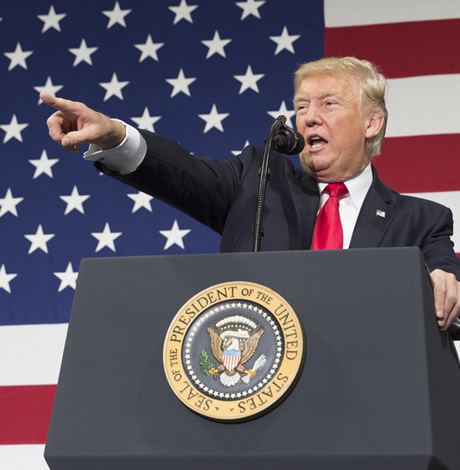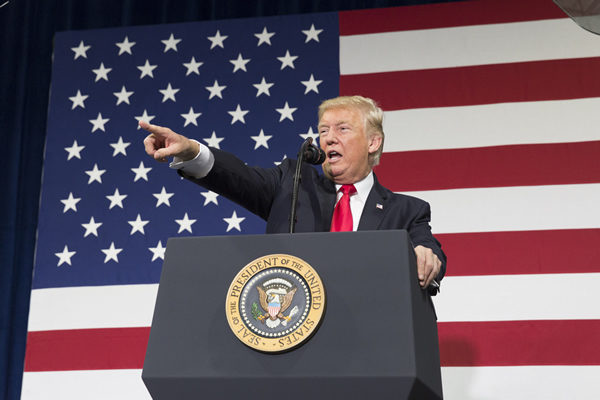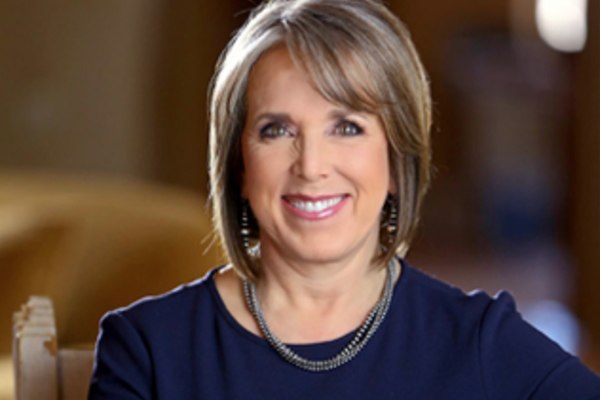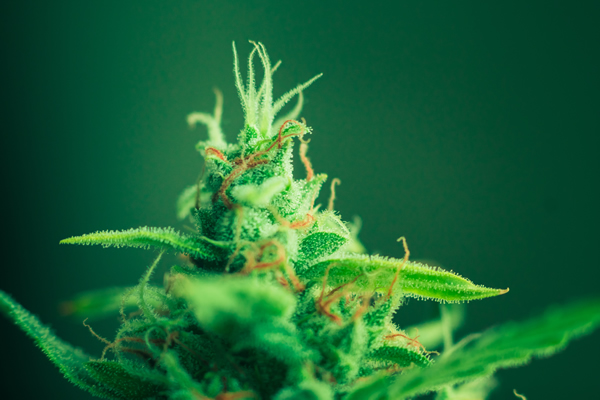Cannabis Culture
Cannabis Culture
Trump: Feds allowing states to choose legalization


Trump: Feds allowing states to choose legalization
The federal government is not standing in the way of states that decide to legalize and regulate marijuana, President Donald Trump said last week in comments first reported by MarijuanaMoment.net.
In response to a reporter’s question regarding whether or not the administration will support a change in federal marijuana policy, President Trump said: “It’s a very big subject and right now we are allowing states to make that decision. A lot of states are making that decision, but we’re allowing states to make that decision.”
During his presidential campaign, Trump similarly said that he believed issues surrounding cannabis legalization ought to be decided “state by state.” However, the administration’s first Attorney General, Jeff Sessions, rescinded an Obama-administration memorandum that directed the Justice Department not to interfere in state-sanctioned marijuana-related activities.
“The reiteration of a non-enforcement policy from the President is a clear sign that states should continue to act in defiance of federal marijuana prohibition,” NORML Political Director Justin Strekal said. “Congress should swiftly move pending legislation forward to remove cannabis from the Controlled Substances Act and provide the legal relief needed to those individuals and businesses who are struggling under our nations cruel policy of criminalization.”
D.C. Council approves workplace protections for cannabis patients
D.C. Council members have enacted legislation — Act Number A23-0114: The Medical Marijuana Program Patient Employment Protection Temporary Amendment Act — to protect qualified patients from workplace discrimination.
The Act states, “A public employer may not refuse to hire, terminate from employment, penalize, fail to promote, or otherwise take adverse employment action against an individual based upon the individual’s status as a qualifying [medical cannabis] patient unless the individual used, possessed, or was impaired by marijuana at the individual’s place of employment or during the hours of employment.”
It further states, “A qualifying patient’s failure to pass a public employer-administered drug test for marijuana components or metabolites may not be used as a basis for employment-related decisions unless reasonable suspicion exists that the qualified patients was impaired by marijuana at the qualifying patient’s place of employment or during hours of employment.”
The law does not apply to either employees in “safety sensitive positions” or to those who are required to undergo drug testing as a federal requirement.
Council members voted 12 to zero in favor of the proposal. Mayor Muriel Bowser did not sign the measure.
Like all District legislation, the act must undergo a 30-day congressional review prior to taking effect.
To date, 15 states provide workplace protections for medical cannabis patients. Two states, Maine and Nevada, provide limited certain non-safety sensitive employers from taking punitive actions against any adult who uses cannabis while off the job.
Calif. advances measure permitting medical cannabis at school
SACRAMENTO, Calif. — State lawmakers have moved forward a measure to permit the use of certain medical cannabis preparations by authorized patients while on school grounds
Members of the Assembly voted last week in favor of the legislation, Senate Bill 223. It now awaits a concurrence vote from the Senate, which approved a prior version of the measure in March by a vote of 29 to 4. Former Gov. Jerry Brown vetoed similar legislation last year.
If passed into law, the measure would permit parents to administer non-smoked formulations of cannabis to patients on school campuses. Several other states, such as Delaware, Illinois, and Washington, already authorize similar activities.
Cannabis retailers linked to drop in local crime: study
PHILADELPHIA — The opening of regulated cannabis retailers is associated with a decrease in localized criminal activity, according to data published in the journal Regional Science and Urban Economics.
A pair of senior economists affiliated with the Federal Reserve Bank of Philadelphia assessed the local effects of retail dispensaries on neighborhood crime in Denver, Colorado. They determined, “[A]n additional dispensary in a neighborhood leads to a reduction of 17 crimes per month per 10,000 residents, which corresponds to roughly a 19 percent decline relative to the average crime rate over the sample period.” The majority of crime reduction is due to a decrease in non-violent criminal activity.
They concluded: “Overall, our results suggest that dispensaries cause an overall reduction in crime in neighborhoods, with no evidence of spillovers to surrounding neighborhoods. … Our results are consistent with theories that predict that marijuana legalization will displace illicit criminal organizations and decrease crime through changes in security behaviors or substitution toward more harmful substances. … Lastly, there is no evidence that increased marijuana use itself results in additional crime.”
The authors’ findings are consistent with those of prior studies concluding that regulating cannabis sales is not associated with upticks in criminal activity and may even play a role in preventing certain crimes, like larceny.
Cannabis Culture news in the Blade is provided in partnership with NORML. For more information, visit norml.org.

Democratic Gov. Michelle Lujan Grisham earlier this month signed two separate measures into law amending the state’s marijuana policies. The first measure (House Bill 2) legalizes and regulates marijuana possession, production, and sales for adults. The second measure (Senate Bill 2) facilitates the automatic review and expungement of the records of those convicted of low-level marijuana offenses.
Lawmakers approved both bills during a special legislative session demanded by Gov. Lujan Grisham, who had been a vocal proponent of the reforms.
NORML State Policies Manager Carly Wolf said: “This is a day to celebrate! New Mexico will greatly benefit from this new revenue stream and the creation of thousands of jobs. Most notably though, legalization will spare thousands of otherwise law-abiding residents from arrest and a criminal record, and the state’s new expungement law will help provide relief to many who are suffering from the stigma and other collateral consequences associated with a prior marijuana conviction.”
The adult-use measure (House Bill 2) permits those ages 21 and older to legally purchase up to two ounces of marijuana and/or up to 16 grams of cannabis extract from licensed retailers. It also permits adults to home-cultivate up to six mature plants for their own personal use. Retail sales would begin by April 2022.
The expungement measure (Senate Bill 2) stipulates that those with past convictions for offenses made legal under this act are eligible for automatic expungement of their records. Those currently incarcerated for such offenses are eligible for a dismissal of their sentence. It’s estimated that over 150,000 New Mexico residents are eligible for automatic expungement under this measure, according to the Department of Public Safety.
Cannabis Culture news in the Blade is provided in partnership with NORML. Visit norml.org for more information.
Cannabis Culture
Delaware cannabis activists take on corporate marijuana
Criticism from medical marijuana operators claimed that HB150 offers too many cultivation and retail licenses

As the country moves forward with sweeping changes in cannabis policy reform, locals in Delaware are tangling with corporate, multi-state medical marijuana permit holders to pass a bill for full legalization.
Adult-use activists and registered medical patients were stunned to hear opposing testimony from Delaware’s medical marijuana operators. Patients already deal with limited access and costly products. Now, many see the established industry voicing opposition as simply obstructing the progress of adult-use legislation. In response, some patients are now staging a boycott of the regulated dispensaries.
During the first committee hearing for HB150, Delaware’s adult-use bill, four of the state’s six currently licensed, multi-million dollar medical cannabis facilities offered negative testimony.
Zoë Patchell, executive director of Delaware CAN responded: “This market belongs to the long-time consumers, patients, and activists. We create the demand, we’ve been the ones driving the reform efforts, and we pay the prices at dispensaries. Cannabis is more than a market – cannabis is a community. These companies cannot reasonably fathom that we are going to purchase cannabis from any entity that has proven to put profits over patients. And now they seem willing to put consumers’ lives and freedom at risk just to hold out for an unfair advantage in the industry.”
These included publicly traded Columbia Care, “Fresh Delaware” aka CCRI, CannTech Research Inc., and the owner of EZY Venture aka “The Farm.”
They all went on record condemning HB150, and pushing a false narrative about oversupply. The core demand from the permit cartel was some protection for their private business interests with guaranteed adult-use licenses.
Criticism from the medical marijuana operators claimed that HB150 offers too many new cultivation and retail licenses, underlined by deep yet unfounded fears that the new competition would put their companies out of business.
Patchell noted, “We are not going to sit back while multi-state corporate entities, that already monopolize East Coast medical markets, work to undermine our social equity and micro-license provisions.”
Cannabis Culture news in the Blade is provided in partnership with NORML. Visit norml.org for more information.
Cannabis Culture
Virginia marijuana legalization takes effect July 1
Adult possession of cannabis up to one ounce without penalty

Following legislative approval of Democratic Gov. Ralph Northam’s amendments to Senate Bill 1406 and House Bill 2312, Virginia became the first southern state to legalize the possession and use of marijuana by adults.
Senate Bill 1406, introduced by Sen. Adam Ebbin (D-30) and Senate President Pro Tempore Senator Louise Lucas (D-18), and House Bill 2312, patroned by House Majority Leader Delegate Charniele Herring (D-46), establish a statutory timeline for the legalization of the commercial marijuana market in Virginia. The measure also permits for the personal possession and cultivation of cannabis by those ages 21 or older.
Last week, Gov. Northam recommended changes to the legislation to permit the personal use provisions of the law to take effect on July 1, 2021 rather than on January 1, 2024, the enactment date initially approved by lawmakers. A majority of the legislature concurred with that change.
Therefore, beginning July 1, 2021, adults will be permitted to possess up to one ounce of marijuana and to cultivate up to four cannabis plants per household without penalty.
The timeline by which state regulators have to enact provisions licensing commercial cannabis production and sales remains July 1, 2024.
Commenting on final passage, NORML Development Director Jenn Michelle Pedini, who also serves as executive director of Virginia NORML, said: “This is an incredible victory for Virginia. Legalization will bring an end to the thousands of low-level marijuana infractions occurring annually in the Commonwealth — ending a discriminatory practice that far too often targets Virginians who are young, poor, and people of color.”
Majority Leader Charniele Herring added: “It is a huge day for equity in the Commonwealth. Virginia is now the first state in the South to legalize recreational marijuana use, and I am so proud to have been able to carry this monumental legislation.”
Sen. Ebbin said, “The passage of SB1406 caps off years of struggle to reform our broken and outdated marijuana laws and begins the deliberate steps to repeal the harms of the failed prohibition. I am thankful to NORML, the governor, and my colleagues for moving this 283 bill from inception to passage over the last four months, and look forward to continuing to partner with them to establish a regulated, equity focused, adult-use marketplace in the coming years.”
Newly released statewide polling data finds that 68 percent of registered voters in Virginia, including majorities of Democrats and Republicans, support legalizing marijuana for adults.
Additional amendments added by Gov. Northam will allow the sealing of records related to crimes involving the misdemeanor possession of marijuana with the intent to distribute. Those records will begin to be sealed starting on July 1, 2021. Separate legislation enacted in 2020 previously sealed records related to misdemeanor marijuana possession.
Records specific to the simple possession of marijuana and/or misdemeanor possession with intent to distribute records will be automatically expunged no later than 2025. Those with records specific to crimes involving the felony possession of marijuana with the intent to distribute may begin to petition the courts for an expounging of their records in 2025.
The bill also allows for the re-sentencing of individuals currently incarcerated for marijuana-related offenses. The measure permits those individuals to have a hearing before the court that originally sentenced them, with legal counsel provided for indigent individuals. However, this portion of the bill must be reenacted in 2022.
The legislation also establishes an independent agency, the Virginia Cannabis Control Authority, to oversee the establishment of regulations that will govern the adult-use market. This agency is set to convene this summer. The remainder of the 300-page bill, which details the regulatory and market structure and social equity provisions, is subject to a second review and vote by the Assembly next year.
Cannabis Culture news in the Blade is provided in partnership with NORML. Visit norml.org for more information.
-

 Africa4 days ago
Africa4 days agoCongolese lawmaker introduces anti-homosexuality bill
-

 District of Columbia14 hours ago
District of Columbia14 hours agoReenactment of first gay rights picket at White House draws interest of tourists
-

 World4 days ago
World4 days agoOut in the World: LGBTQ news from Europe and Asia
-

 Arizona19 hours ago
Arizona19 hours agoAriz. governor vetoes anti-transgender, Ten Commandments bill










